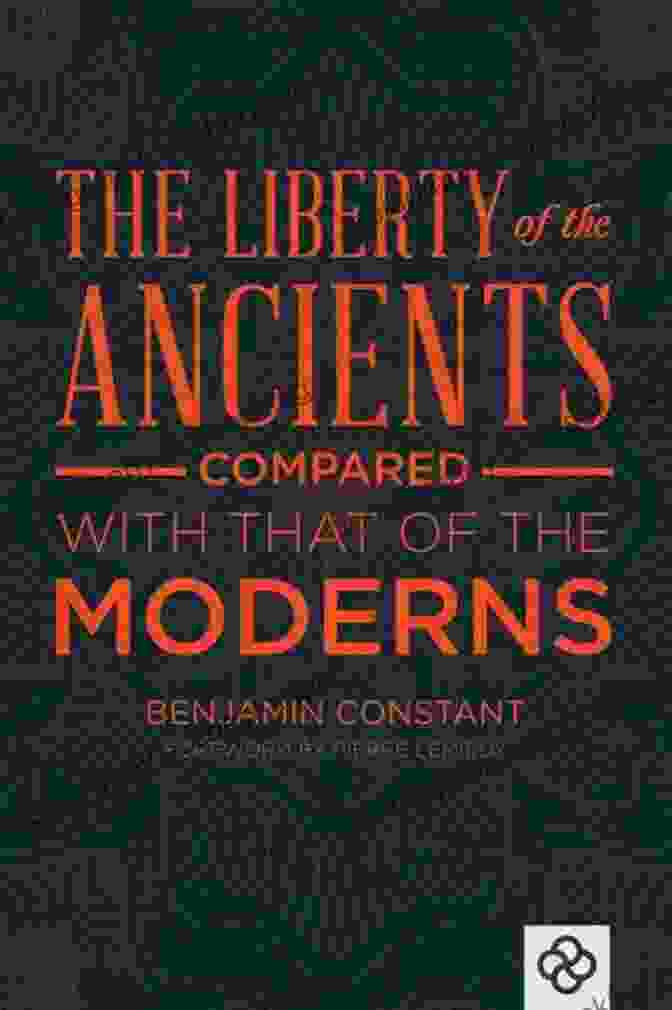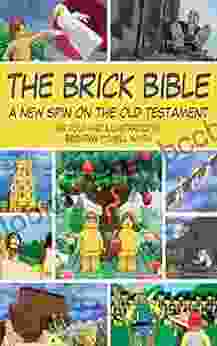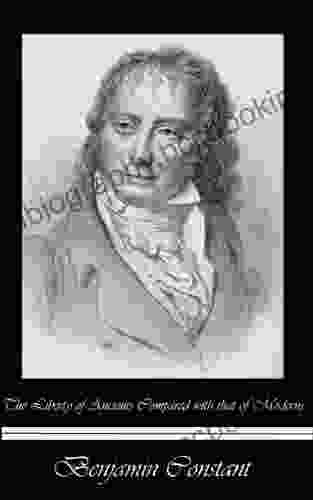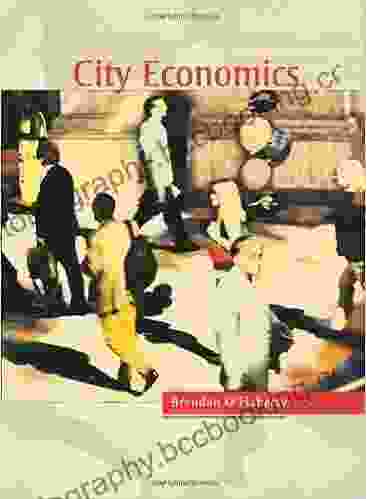The Liberty of Ancients Compared with That of Moderns: A Masterpiece of Political Thought


An Intellectual Journey Through the Evolution of Liberty
Benjamin Constant's seminal treatise, "The Liberty of Ancients Compared with That of Moderns," embarks on a profound intellectual odyssey, exploring the contrasting conceptions of liberty that have shaped human societies throughout history. First published in 1819, this masterpiece has endured as a cornerstone of political thought, offering a timeless and nuanced understanding of the nature and limits of freedom.
4.4 out of 5
| Language | : | English |
| File size | : | 365 KB |
| Text-to-Speech | : | Enabled |
| Screen Reader | : | Supported |
| Enhanced typesetting | : | Enabled |
| Word Wise | : | Enabled |
| Print length | : | 21 pages |
Constant's work meticulously dissects the divergent views of liberty held by the ancients, particularly the Athenians and Romans, and the moderns, epitomized by the Protestant nations of Western Europe. By delving into the historical contexts, social structures, and philosophical underpinnings of these civilizations, he reveals the fundamental differences that have defined their respective understanding of individual rights and self-governance.
Ancient Liberty: A Collective Ideal
In ancient Greece and Rome, liberty was conceived as an active and participatory concept. Citizens were expected to engage directly in the political process, assuming a collective responsibility for shaping the destiny of their communities. This participatory model of liberty emphasized the importance of public life, civic duty, and shared decision-making.
Constant argues that such an understanding of liberty was deeply intertwined with the social and political realities of ancient societies. The small size of city-states facilitated direct citizen involvement, while the absence of representative institutions made it possible for individuals to have a tangible impact on public affairs. Moreover, the concept of shared citizenship fostered a sense of mutual obligation and responsibility among the members of a community.
Modern Liberty: Individual Rights and Private Sphere
In contrast to the ancients, Constant posits that modern liberty places greater emphasis on individual rights and the sanctity of the private sphere. This shift is attributed to the rise of individualism, the growth of commercial society, and the separation between church and state that characterized the modern era.
Modern liberty, as Constant conceives it, is not simply the absence of external constraints but rather a positive guarantee of individual autonomy and the right to pursue one's own interests without interference from the state or other societal institutions. This view of liberty prioritizes the protection of private property, freedom of conscience, and the right to personal security.
The Role of Representative Government
One of the key distinctions that Constant draws between ancient and modern liberty is the role of representative government. In ancient societies, citizens participated directly in the political process through assemblies and councils. However, as cities grew in size and complexity, representative government emerged as a necessary means of ensuring popular participation in decision-making.
Constant argues that representative government is essential for the preservation of modern liberty. It allows for a broader range of voices to be heard, protects against the tyranny of the majority, and provides for the continuity and stability of political institutions. While acknowledging the potential for abuse within representative systems, Constant believes that they offer the best balance between individual rights and collective authority.
Comparing the Two Models: A Balanced Perspective
Constant does not seek to establish one model of liberty as superior to the other. Rather, he argues that each conception is rooted in the specific historical and social conditions that have shaped different societies.
Ancient liberty, with its emphasis on collective participation and civic virtue, may be more suited to small-scale, homogeneous communities. Modern liberty, with its focus on individual rights and the sanctity of the private sphere, may be more appropriate for larger, more diverse societies.
Ultimately, Constant believes that the best form of government is one that strikes a balance between these two ideals, preserving the essential elements of both ancient and modern liberty. Such a government would foster active citizenship, protect individual rights, and ensure the well-being of all members of society.
Relevance to Contemporary Issues
Constant's work remains profoundly relevant to contemporary discussions about the nature of liberty and the role of government in society. In an era marked by globalization, rising inequality, and the erosion of privacy, his insights into the historical evolution of liberty provide a valuable framework for understanding the challenges and opportunities that we face.
By examining the contrasting models of ancient and modern liberty, Constant challenges us to consider the delicate balance between individual autonomy and collective responsibility. His work reminds us that liberty is not a static concept but rather a dynamic force that must be continually redefined and defended in response to changing social and political conditions.
Benjamin Constant's "The Liberty of Ancients Compared with That of Moderns" is a seminal work of political thought that has had a profound impact on our understanding of liberty. By tracing the evolution of liberty from its ancient origins to its modern manifestations, Constant provides a nuanced and balanced analysis of this fundamental human right.
Whether you are a scholar, a student of history, or simply an individual seeking to deepen your understanding of liberty, "The Liberty of Ancients Compared with That of Moderns" is an essential read. Its enduring relevance and timeless insights continue to guide our thinking about the nature of freedom and the challenges that lie ahead in preserving it.
4.4 out of 5
| Language | : | English |
| File size | : | 365 KB |
| Text-to-Speech | : | Enabled |
| Screen Reader | : | Supported |
| Enhanced typesetting | : | Enabled |
| Word Wise | : | Enabled |
| Print length | : | 21 pages |
Do you want to contribute by writing guest posts on this blog?
Please contact us and send us a resume of previous articles that you have written.
 Book
Book Novel
Novel Page
Page Chapter
Chapter Text
Text Story
Story Genre
Genre Reader
Reader Library
Library Paperback
Paperback E-book
E-book Magazine
Magazine Newspaper
Newspaper Paragraph
Paragraph Sentence
Sentence Bookmark
Bookmark Shelf
Shelf Glossary
Glossary Bibliography
Bibliography Foreword
Foreword Preface
Preface Synopsis
Synopsis Annotation
Annotation Footnote
Footnote Manuscript
Manuscript Scroll
Scroll Codex
Codex Tome
Tome Bestseller
Bestseller Classics
Classics Library card
Library card Narrative
Narrative Biography
Biography Autobiography
Autobiography Memoir
Memoir Reference
Reference Encyclopedia
Encyclopedia Brad Brewer
Brad Brewer Barbara O Neill
Barbara O Neill Braun Anthony
Braun Anthony Berlitz Publishing
Berlitz Publishing Ben Doughty
Ben Doughty Bobbi J G Weiss
Bobbi J G Weiss Beth Gardiner
Beth Gardiner Bob Spitz
Bob Spitz Barry Kirwan
Barry Kirwan Brad King
Brad King Benjamin R Jordan
Benjamin R Jordan Barry Michael Broman
Barry Michael Broman Becca Puglisi
Becca Puglisi Boyd Craven Iii
Boyd Craven Iii Ben Foss
Ben Foss Birdie Garcia
Birdie Garcia Betty Halbreich
Betty Halbreich Billy Mclean
Billy Mclean Brad Gilbert
Brad Gilbert Ben Swanepoel
Ben Swanepoel
Light bulbAdvertise smarter! Our strategic ad space ensures maximum exposure. Reserve your spot today!

 Ralph Waldo EmersonGrona Boy Go Zion: A Journey of Hope, Redemption, and the Power of Music
Ralph Waldo EmersonGrona Boy Go Zion: A Journey of Hope, Redemption, and the Power of Music Al FosterFollow ·5.9k
Al FosterFollow ·5.9k Rick NelsonFollow ·6.5k
Rick NelsonFollow ·6.5k Clarence MitchellFollow ·7.5k
Clarence MitchellFollow ·7.5k Gabriel HayesFollow ·19.5k
Gabriel HayesFollow ·19.5k Allen ParkerFollow ·14.1k
Allen ParkerFollow ·14.1k Gil TurnerFollow ·15.9k
Gil TurnerFollow ·15.9k Ethan MitchellFollow ·3k
Ethan MitchellFollow ·3k Clay PowellFollow ·13.2k
Clay PowellFollow ·13.2k

 Alex Foster
Alex FosterRediscover the Old Testament with a Captivating Graphic...
Prepare to embark on an extraordinary...

 Ross Nelson
Ross NelsonThe Christmas Story: The Brick Bible for Kids
LEGO® Bricks Meet the...

 Anton Chekhov
Anton ChekhovUnveiling the Hidden History: The Brick Chronicle of...
In the annals of American history, the...

 Blake Bell
Blake BellOptions Trading Crash Course: A Comprehensive Guide to...
In the fast-paced and...

 Percy Bysshe Shelley
Percy Bysshe ShelleyUnlock Your Artistic Potential with "The Practical...
The Indispensable Handbook for...
4.4 out of 5
| Language | : | English |
| File size | : | 365 KB |
| Text-to-Speech | : | Enabled |
| Screen Reader | : | Supported |
| Enhanced typesetting | : | Enabled |
| Word Wise | : | Enabled |
| Print length | : | 21 pages |












